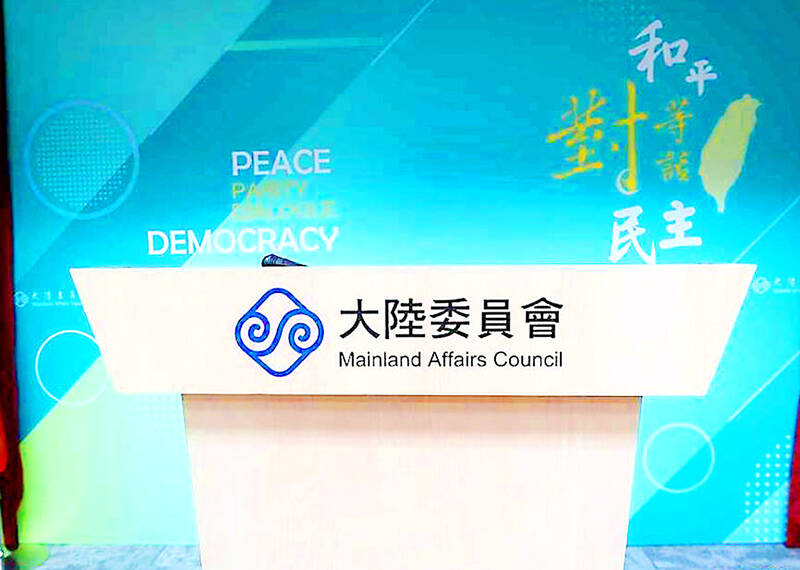The Mainland Affairs Council (MAC) is to tighten regulations regarding Taiwanese holding official posts in China’s military, government or political parties, adding hundreds of Chinese groups and agencies to its prohibited organizations list.
Article 33 of the Act Governing Relations Between the People of the Taiwan Area and the Mainland Area (臺灣地區與大陸地區人民關係條例) stipulates that Taiwanese cannot hold any position or become a member of Chinese political parties, military, administration or organizations of any political nature listed by the council.
Those who contravene the regulation face a fine of NT$100,000 to NT$500,000, the act says.

Photo: Chung Li-hua, Taipei Times
The Chinese system of government is complex and the organizational structure sometimes changes, making it impossible to compile an exhaustive list of banned agencies and organizations, the council said.
Beijing has undergone restructuring several times in the past two decades, so it is increasingly difficult for regulations to remain in line with the current situation, it said.
To prevent China from circumventing Taiwan’s regulations, the amended act would ban Taiwanese from holding posts in China’s military, government or any political party and political organization that “is linked to national identity or loyalty,” “conducts united front work against Taiwan” or “is considered a threat to the national security or interests” of Taiwan.
Beijing has in the past few years increased its efforts to promote integration and annexation of Taiwan, as well as to use Taiwanese to influence public opinion, the MAC said.
By recruiting Taiwanese to positions not listed by the council, China aims to create the illusion of cross-strait integration, establish a model for its “united front” campaign and affect public morale, it said.
The amendments are designed to protect national security and stability, and prevent Chinese “united front” efforts and other attempts to infiltrate and divide Taiwan, it said.
The banned list is to include the Association for Relations Across the Taiwan Straits, the All-China Federation of Taiwan Compatriots and the Confucius Institute, as well as the People’s Daily (人民日報), the Qiushi Journal (求是雜誌) and the Guang Ming Daily (光明日報).
It would also include the Chinese People’s Liberation Army Academy of Military Sciences, the China Academy of Engineering Physics, the Revolutionary Committee of the Chinese Kuomintang, the China Democratic League, the China National Democratic Construction Association, the China Association for Promoting Democracy, the Chinese Peasants’ and Workers’ Democratic Party, the China Zhi Gong Party, the Jiusan Society and the Taiwan Democratic Self-Government League.

SECURITY: As China is ‘reshaping’ Hong Kong’s population, Taiwan must raise the eligibility threshold for applications from Hong Kongers, Chiu Chui-cheng said When Hong Kong and Macau citizens apply for residency in Taiwan, it would be under a new category that includes a “national security observation period,” Mainland Affairs Council (MAC) Minister Chiu Chui-cheng (邱垂正) said yesterday. President William Lai (賴清德) on March 13 announced 17 strategies to counter China’s aggression toward Taiwan, including incorporating national security considerations into the review process for residency applications from Hong Kong and Macau citizens. The situation in Hong Kong is constantly changing, Chiu said to media yesterday on the sidelines of the Taipei Technology Run hosted by the Taipei Neihu Technology Park Development Association. With

A US Marine Corps regiment equipped with Naval Strike Missiles (NSM) is set to participate in the upcoming Balikatan 25 exercise in the Luzon Strait, marking the system’s first-ever deployment in the Philippines. US and Philippine officials have separately confirmed that the Navy Marine Expeditionary Ship Interdiction System (NMESIS) — the mobile launch platform for the Naval Strike Missile — would take part in the joint exercise. The missiles are being deployed to “a strategic first island chain chokepoint” in the waters between Taiwan proper and the Philippines, US-based Naval News reported. “The Luzon Strait and Bashi Channel represent a critical access

‘FORM OF PROTEST’: The German Institute Taipei said it was ‘shocked’ to see Nazi symbolism used in connection with political aims as it condemned the incident Sung Chien-liang (宋建樑), who led efforts to recall Democratic Progressive Party (DPP) Legislator Lee Kun-cheng (李坤城), was released on bail of NT$80,000 yesterday amid an outcry over a Nazi armband he wore to questioning the night before. Sung arrived at the New Taipei City District Prosecutors’ Office for questioning in a recall petition forgery case on Tuesday night wearing a red armband bearing a swastika, carrying a copy of Adolf Hitler’s Mein Kampf and giving a Nazi salute. Sung left the building at 1:15am without the armband and apparently covering the book with a coat. This is a serious international scandal and Chinese

COUNTERINTELLIGENCE TRAINING: The ministry said 87.5 percent of the apprehended Chinese agents were reported by service members they tried to lure into becoming spies Taiwanese organized crime, illegal money lenders, temples and civic groups are complicit in Beijing’s infiltration of the armed forces, the Ministry of National Defense (MND) said in a report yesterday. Retired service members who had been turned to Beijing’s cause mainly relied on those channels to infiltrate the Taiwanese military, according to the report to be submitted to lawmakers ahead of tomorrow’s hearing on Chinese espionage in the military. Chinese intelligence typically used blackmail, Internet-based communications, bribery or debts to loan sharks to leverage active service personnel to do its bidding, it said. China’s main goals are to collect intelligence, and develop a